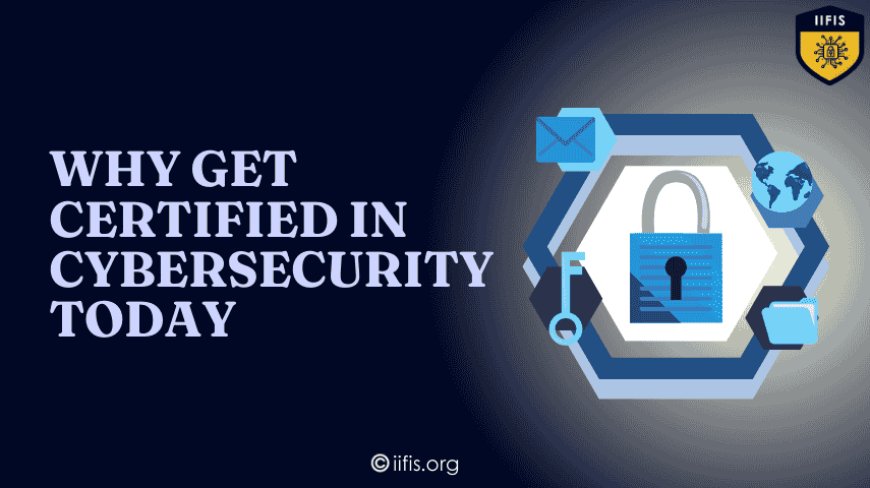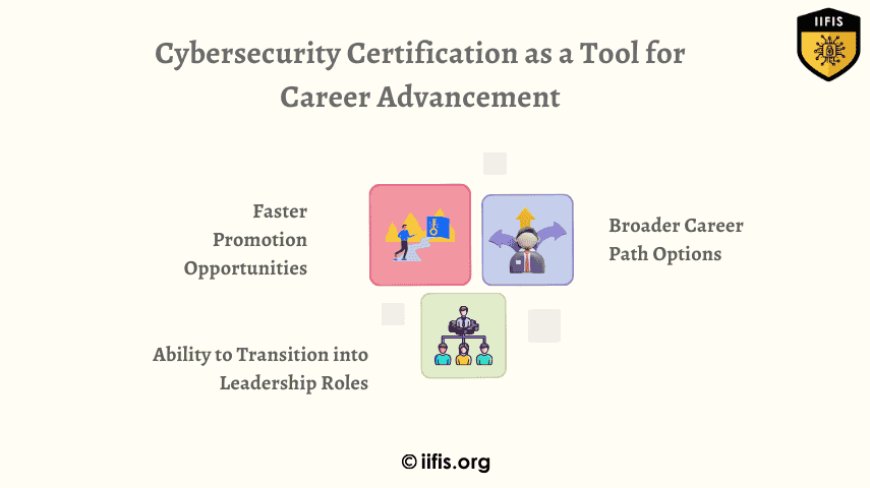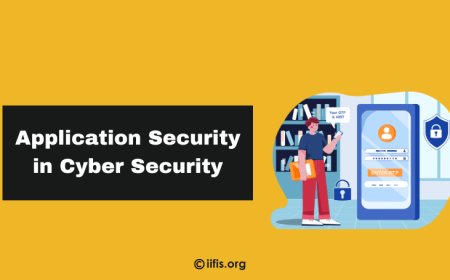Why Get Certified in Cybersecurity Today
Boost your career with a certification. Gain essential skills, improve job prospects, and stay competitive in a fast-evolving digital world.

Cybersecurity has become a crucial field as our lives and businesses are increasingly tied to the digital world. From protecting personal data to defending against cyber-attacks on organizations, the demand for skilled cybersecurity professionals is on the rise. But what sets you apart in this competitive field? Certification. Getting certified in cybersecurity can open doors to better job opportunities, higher salaries, and the skills you need to make a real impact. This guide explores why cybersecurity certification matters, the career advantages it offers, and how it can provide the knowledge and credibility to stand out in this essential industry.
The Benefits of Cybersecurity Certification
-
Validation of Skills and Knowledge
A cybersecurity certification shows that you have a solid understanding of essential security practices and tools. It serves as proof that you’ve met industry standards, giving employers confidence in your skills. -
Increased Career Opportunities
The demand for cybersecurity professionals is growing across various sectors. With certification, you can qualify for specialized roles, from network security to ethical hacking, and access a broader range of job opportunities. -
Higher Earning Potential
Certified professionals often earn higher salaries than their non-certified counterparts. Employers recognize the value of certification and may offer better pay and benefits to those who bring verified skills to the table. -
Credibility and Recognition
Certification earns you respect and recognition within the industry. It shows your commitment to the field, making you stand out to employers and colleagues as a trusted and knowledgeable professional.
Getting certified in cybersecurity not only builds your expertise but also opens doors to career growth and greater financial rewards.
Key Cybersecurity Certifications to Consider
-
Beginner-Level Certifications
-
Certified Cybersecurity Technician (CCT): This certification focuses on practical skills for handling basic cybersecurity tasks, making it a good fit for those wanting hands-on experience with incident response, network troubleshooting, and security monitoring.
-
Intermediate-Level Certifications
-
Certified Information Systems Security Professional (CISSP): CISSP is a well-rounded certification for those with some experience, covering a broad range of topics like security management, access control, and software development security. It’s suited for those looking to advance into roles like security analyst or IT security manager.
-
Certified Ethical Hacker (CEH): CEH is tailored for those interested in penetration testing and ethical hacking. It teaches techniques for identifying vulnerabilities in systems, making it ideal for roles in ethical hacking and network defense.
-
Advanced-Level Certifications
-
Certified Information Security Manager (CISM): CISM is focused on managing information security programs, risk management, and governance. It’s best suited for experienced professionals moving into managerial positions within cybersecurity.
-
Certified Information Systems Auditor (CISA): CISA focuses on auditing, assessing, and controlling information systems. It’s ideal for roles in IT auditing, compliance, and risk management.
-
Offensive Security Certified Professional (OSCP): Known for its hands-on approach, OSCP requires candidates to solve real-world security challenges. It’s a strong choice for those specializing in advanced penetration testing and red team roles.
Choosing the right certification depends on your experience level and career goals. These certifications help you build skills and credentials for a wide range of cybersecurity roles, from technical positions to management and auditing.
How Certification Can Help You Stand Out in the Job Market
-
Increasing Competition in Cybersecurity
As cybersecurity grows, more professionals are entering the field, making it competitive. Certifications can give you an edge by showcasing your specialized knowledge and dedication to mastering key skills, helping you stand out among other candidates. -
Employer Preferences for Certified Candidates
Many employers look for certified professionals because certification shows you have met specific standards and have a reliable skill set. Having a certification often means you’ll meet job requirements more easily and may have an advantage in the hiring process. -
Building Trust with Clients and Stakeholders
Certifications show your commitment to security best practices, which builds trust with both clients and colleagues. When people see that you’re certified, they know you have the knowledge to protect data and handle security challenges effectively.
Earning a certification can make a real difference in a competitive job market, helping you demonstrate your expertise, meet employer expectations, and build trust in your abilities.
Cybersecurity Certification as a Tool for Career Advancement

-
Faster Promotion Opportunities
Earning a certification can help speed up your career growth. Many employers see certifications as a sign of dedication and expertise, which may lead to faster promotions and more responsibility. It shows you’re committed to improving your skills, which can make you a top candidate for advancement. -
Broader Career Path Options
Certifications open doors to a wider range of roles in cybersecurity. For example, a certified professional can move into specialized areas like cybersecurity analyst, penetration tester, or network security engineer. Whether you’re interested in working with security systems or identifying vulnerabilities, certifications allow you to explore different career paths. -
Ability to Transition into Leadership Roles
Some certifications focus on management and auditing, preparing you for leadership positions. If you’re interested in overseeing security programs, managing teams, or handling compliance, certifications in areas like auditing (CISA) or information security management (CISM) can help you transition into higher-level, strategic roles.
In summary, cybersecurity certifications not only boost your knowledge but also help you move up the career ladder faster, explore specialized roles, and prepare for leadership positions.
Meeting Industry Compliance and Regulatory Requirements
-
Understanding Compliance Standards
Certified professionals are valued because they understand and follow the industry’s regulations, ensuring companies meet legal requirements. -
Certifications and Legal Requirements
Certifications ensure you’re familiar with key standards like GDPR, HIPAA, and PCI-DSS, which are crucial for protecting sensitive data. -
Minimizing Risks for Organizations
Certified experts help reduce the risk of security breaches and fines by ensuring compliance with industry regulations, keeping businesses secure and legal.
certifications are essential for meeting regulatory standards, preventing legal issues, and minimizing risks for organizations.
Continuous Learning and Skill Enhancement
-
Keeping Up with Technological Change
Cybersecurity is a constantly evolving field, and certifications encourage ongoing learning to stay up-to-date with the latest tools and techniques. This helps professionals keep their skills relevant in a fast-changing industry. -
Access to Up-to-Date Knowledge and Resources
Many certifications require continuing education, which ensures that professionals stay informed about new threats, technologies, and best practices. This ongoing learning helps keep you prepared for the latest challenges in cybersecurity. -
Networking with Cybersecurity Professionals
Being certified often gives you access to exclusive events, online forums, and communities where you can connect with other cybersecurity professionals. This provides valuable opportunities to learn from others, share experiences, and stay updated on industry trends.
continuous learning through certification keeps you up-to-date, improves your skills, and connects you with a network of experts in the field.
How to Choose the Right Cybersecurity Certification
-
Assessing Your Current Skill Level
Choose a certification that matches your experience. If you're just starting, look for beginner-level certifications like CompTIA Security+. If you have some experience, intermediate options like CISSP might be more suitable. Make sure the certification aligns with your current skills and where you want to grow. -
Understanding Your Career Goals
Different certifications cater to different roles. For technical positions, certifications like Certified Ethical Hacker (CEH) might be a good fit. If you’re aiming for a leadership role, certifications like CISM (Certified Information Security Manager) can help you develop management skills. -
Reviewing Certification Costs and Time Commitment
Consider both the cost and time required to complete the certification. Some certifications may require several months of study, while others may be quicker or more affordable. Be realistic about your budget and how much time you can dedicate to studying.
Steps to Get Certified in Cybersecurity
-
Preparation and Study Resources
To prepare for exams, use reliable study guides, practice exams, and online courses. Websites like Udemy, LinkedIn Learning, and Cybrary offer courses that cover the exam objectives. Practice exams are especially useful to get a feel for the type of questions that may appear. -
Exam Tips and Tricks
Focus on understanding key concepts rather than memorizing information. Take practice tests to identify weak areas and review them carefully. On exam day, manage your time well and don’t get stuck on any one question for too long. -
Next Steps After Certification
Once certified, update your resume with your new qualification and build a portfolio showcasing your skills and experience. Start applying for jobs or seeking promotions, and continue learning to stay ahead in the field. Certifications can help open doors to new opportunities and career advancement.
Cybersecurity certifications offer many benefits in today’s job market. They validate your skills, open doors to better job opportunities, increase earning potential, and help you stand out in a competitive field. By obtaining certifications, you demonstrate a commitment to staying current with industry standards and regulations, making you more attractive to employers.
If you're looking to capitalize on the high demand and growing career opportunities in cybersecurity, starting your journey toward certification is a great first step. Consider joining professional organizations like IIFIS (International Institute of Information Security) for additional resources and networking opportunities. By taking action now, you can position yourself for success in a thriving and rewarding career path.
























